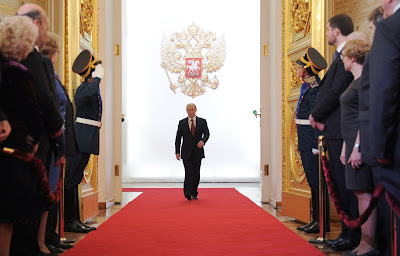The Analytical Credit Rating Agency: A New Entrant That Will Further Enhance Russia’s Isolation
This short post is based upon a
forthcoming article by this author that examines the viability of the latest
entrant into the credit rating arena, the Analytical Credit Rating Agency
(ACRA). The article, which is due to be published in the European Company Law
Journal (and is available here in
a pre-published version), looks at the chances of the ACRA succeeding when
viewed within the parameters of perception,
an aspect that underpins the credit rating sector. For this post, the focus
will be upon introducing the ACRA, and then on examining the effect it may have
upon the wider political issues affecting the Russian Federation.
The Analytical Credit Rating Agency
was established in November 2015
and comprises of 27 major Russian companies and financial institutions that
serve as its shareholders. The agency, which became the first rating agency to receive
accreditation from the Russian Central Bank
under the new N 222-FZ Law
which was designed to protect investors, has a relatively small operating
capital of 3 billion roubles, or around £42 million. Nevertheless, the agency
has a defined code of
conduct, and aims to embody its key
principles of independence, prevention of conflicts of interests, timely
disclosures, and increased compliance procedures. Whilst these aspects are to
be expected of any new entrant to the credit rating market place, the ACRA aims
to make clear that its dedication to these principles separate it from its
competitors. However, whilst the official line seems perfectly normal, there
are other issues that some suspect may hamper any gains the agency may make.
Under the new laws drafted by the
Russian Central Bank, rating agencies operating in Russia are to be subjected
to an increasing amount of intervention and regulation. For example, the new
law gives the central bank the ability to supervise any agency acting in its
jurisdiction on a daily basis,
and also allows it to actively intervene in the composition of its board and
management structure. As such, and in a much anticipated move, the leading
rating agencies have reacted negatively to these developments and have
ultimately withdrawn from the Russian market, with Moody’s
and Fitch both closing their Moscow operations and withdrawing their
ratings for Russian debt (Standard & Poor’s is in discussion with the
Central Bank about how it may maintain its presence but not be subjected to the
new law). With the ACRA being the first agency to be successfully granted accreditation
under the new regulations, it may seem obvious to state that the situation
looks rosy for the new agency. However, the knock on effects could be disastrous.
The situation started with Russia’s annexation of Crimea, which ultimately led
to sanctions from the U.S. against the Country and many of its leading business
figures. As such, the leading rating agencies, all American of course,
subsequently could not provide ratings for the businesses of these connected
figures and, as Deputy Finance Minister Alexey Moiseev recently stated ‘we
didn’t have any idea of those banks’ credit quality’. With the ACRA, there
is now an organisation that will supply ratings for these connected
institutions, but the interconnectedness between Vladimir Putin and business in
Russia has led many to proclaim that the ACRA is simply ‘Putin’s
rating agency’, a claim which has been vociferously
denied by ACRA’s CEO Ekaterina Trofimova. Whilst there is no evidence of
Putin’s connection to the new firm, the perceived
connection is arguably more than enough to keep the suggestion going.
Ultimately, the ACRA is a response
to global-political issues that see Russia needing to fend for itself. The recent
downgrading of Russian debt to ‘junk’
status, and also the ‘indefinite’
sanctions levied against the country in the wake of the annexation of Crimea,
mean that Russia is, potentially, being cast adrift in terms of its position
within the global marketplace. The recent escalation
in tension between the U.S. and Russia seems to be indicative of sentiment
that is based upon fragmentation and division, and the ACRA arguably represents
the realisation of this sentiment within the corridors of the Kremlin. Whilst
the move to create a nationally-focused rating agency makes sense for Putin in
the current eco-political climate, it will perhaps hasten the seemingly
inevitable situation whereby Russian debt becomes too risky for the global
capital markets to hold. This process has already begun with the appropriation
of the ‘junk’ status by the largest rating agencies, but Putin’s insistence on
not bowing to their evaluations means that the chances of Russia returning to
the global table, in terms of debt issuances, are more remote than ever before.
Whilst this author has written a number of pieces suggesting that we, as a
global society, need to move away from the Big Three’s ratings, there is an
argument that would say now is not the time for Russia to be withdrawing ever
further away from the global capital marketplace. The global economy would be
much better served with an outward-looking Russia, but the recent establishment
and cementation of the ACRA suggests that an inward-looking Russia is the one
that we shall bear witness to in the near future, and perhaps even further into
the future – the effects of this may be extreme in a number of possible
circumstances.





Comments
Post a Comment